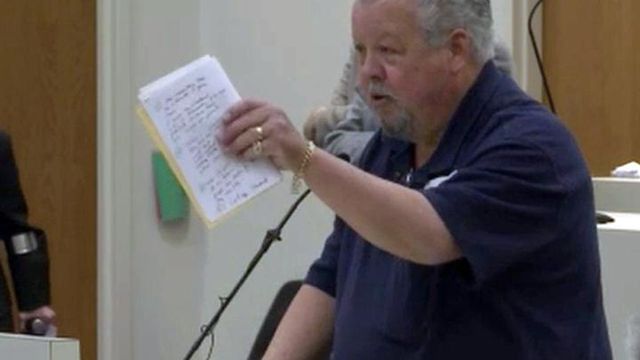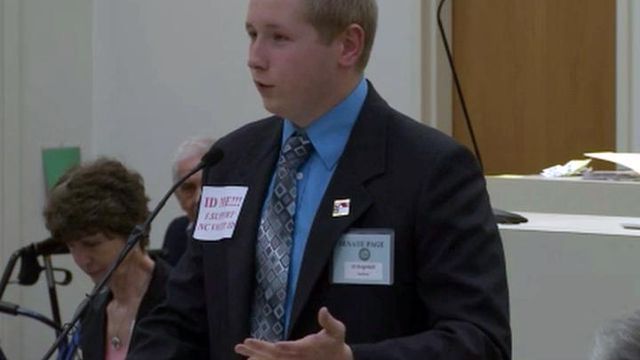House committee takes up voter ID proposal
The House Elections Committee on Wednesday continued the deliberate process Republicans mapped out for their plan to get legislation approved that would require voters to present photo identification at the polls.
Posted — UpdatedThe committee held its second four-hour public hearing to receive comments about voter ID. Last month, opponents of the idea packed the meeting, but speakers at Wednesday's hearing were overwhelmingly in favor of IDs.
"Stop the fraud, restore integrity to voting and support voter photo ID," said John Garrett, chairman of the Halifax County Republican Party, who was among dozens wearing white "ID ME!!!" stickers on their lapels.
Members of a group known as the Voter Integrity Project detailed various cases of voter fraud, including five people who voted in both North Carolina and Florida and a 2012 ballot cast in the name of a Charlotte-area man who died five years earlier. They argued that voter fraud is seen as nonexistent in North Carolina because cases are rarely prosecuted.
A handful of people who said they have served as poll workers described instances of a woman voting multiple times, students using friends' addresses to register to vote and people showing up at the polls with voters' names on strips of paper.
"I don't want to give up my vote to someone who's not legally voting," Wake County resident Mike Binney said.
Approved forms of IDs that have expired would be accepted up to 10 years from their date of issuance or date of expiration, whichever is later. For voters over 70, a photo ID that was valid at the time they were 70 will be considered valid indefinitely.
Voters without a photo ID will be allowed to cast a provisional ballot but would have to return to their local board of elections with a valid photo ID to have the ballot counted.
Some speakers at the public hearing called for even stricter requirements, such as disallowing student IDs or expired IDs and outlawing one-stop registration and voting.
"The bill before you is as weak as water," said Don Yelton of Buncombe County. "You've got too many ways for them to get their IDs."
Voter ID opponents were far outnumbered but were no less passionate than supporters.
Vickie Boyer of Orange County said requiring an ID to vote turns the American tenet of "innocent until proven guilty" on its head.
"It replaces voters in charge of the government to the government being in charge of the voters," Boyer said.
Other speakers complained that the restrictions are tighter for people trying to vote in person than for those casting mail-in absentee ballots. The bill would allow absentee voters to submit a driver's license number, the final four digits of a Social Security number or other federally-approved identification documents like a copy of a utility bill.
"Why is a utility bill, bank statement or payroll stub acceptable for absentee voters but not for someone who votes in person?" asked Lee Mortimer of Durham County. "There can be no explanation other than you want to make it harder for people to vote."
NAACP assails voter ID bill
Earlier in the day, bill sponsors presented the "Voter Information Verification Act," or VIVA, to the committee and answered some preliminary questions. The committee is expected to hold a full debate of the proposal next week before voting on it.
Rev. William Barber, state president of the NAACP, assailed the bill during a committee hearing, saying it marks a return to "Old South policies" that marked the poor and minorities for discrimination.
"Those of you pushing this bill are scared of true democracy," Barber said, arguing that calls for a voter ID bill surfaced only after the numbers of black and Latino voters surged in recent years.
"Let the people vote," he said.
A disproportionate number of black, elderly and female voters don't have a photo ID, Barber said, and he rebutted arguments that many daily activities now require such proof of identity by noting that they are only privileges and not a constitutionally protected right.
"(You) are leading this state down a dangerous path," he said. "We have already fought these battles."
Jerry Bonnet, a lawyer for the Indiana Secretary of State's Office, told the House committee that cases of people being unable to vote in that state because of its voter ID requirements are practically nonexistent.
"Projections and studies that prognosticated many individuals not being able to vote, widespread voter disenfranchisement, different types of doom and gloom – that isn't what happened," Bonnet said.
Given the difficulty of removing names from bloated voter rolls, he said, voter ID laws are the easiest way to ensure elections are free of cases in which people might be casting votes in others' names.
Indiana provides free IDs to anyone over 16 who doesn't have one, he said.
North Carolina's proposal would require people attest under the penalty of perjury that they have a "financial hardship" in order to get a free voter ID – as well as free copy of a birth certificate to establish their identity for the ID. "Financial hardship" isn't defined in the bill, however, and some have suggested that provision could be construed as an unconstitutional poll tax.
Lawmakers don't yet have a projected cost for the voter ID proposal, including providing free IDs and birth certificates, hiring 14 employees for a new Voter Information Verification Agency, which would work with counties to promote the ID requirement and assist voters and creating a statewide digital database of photos, perhaps using facial recognition software, that could make carrying an ID to the polls unnecessary.
Copyright 2024 by Capitol Broadcasting Company. All rights reserved. This material may not be published, broadcast, rewritten or redistributed.






